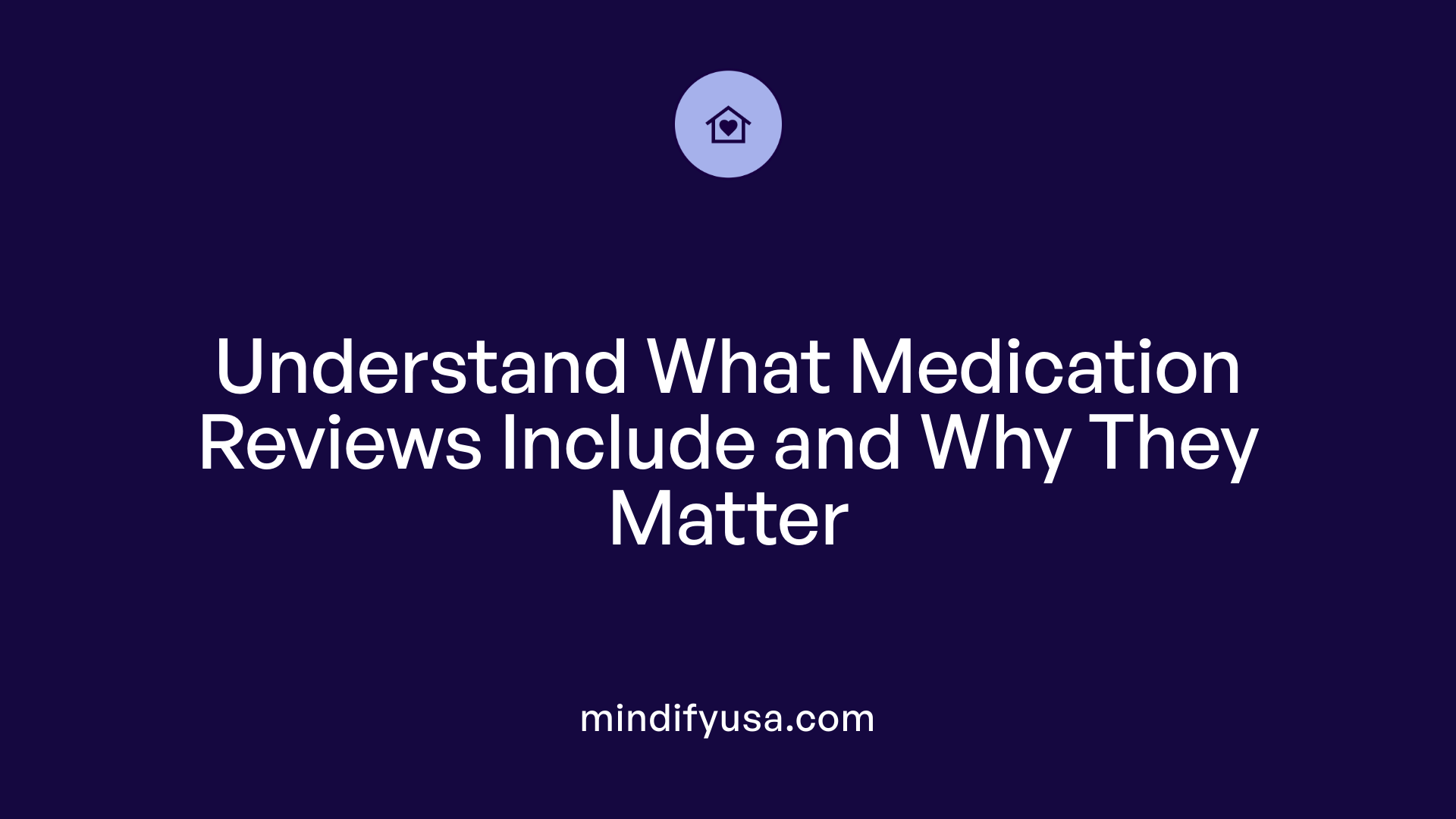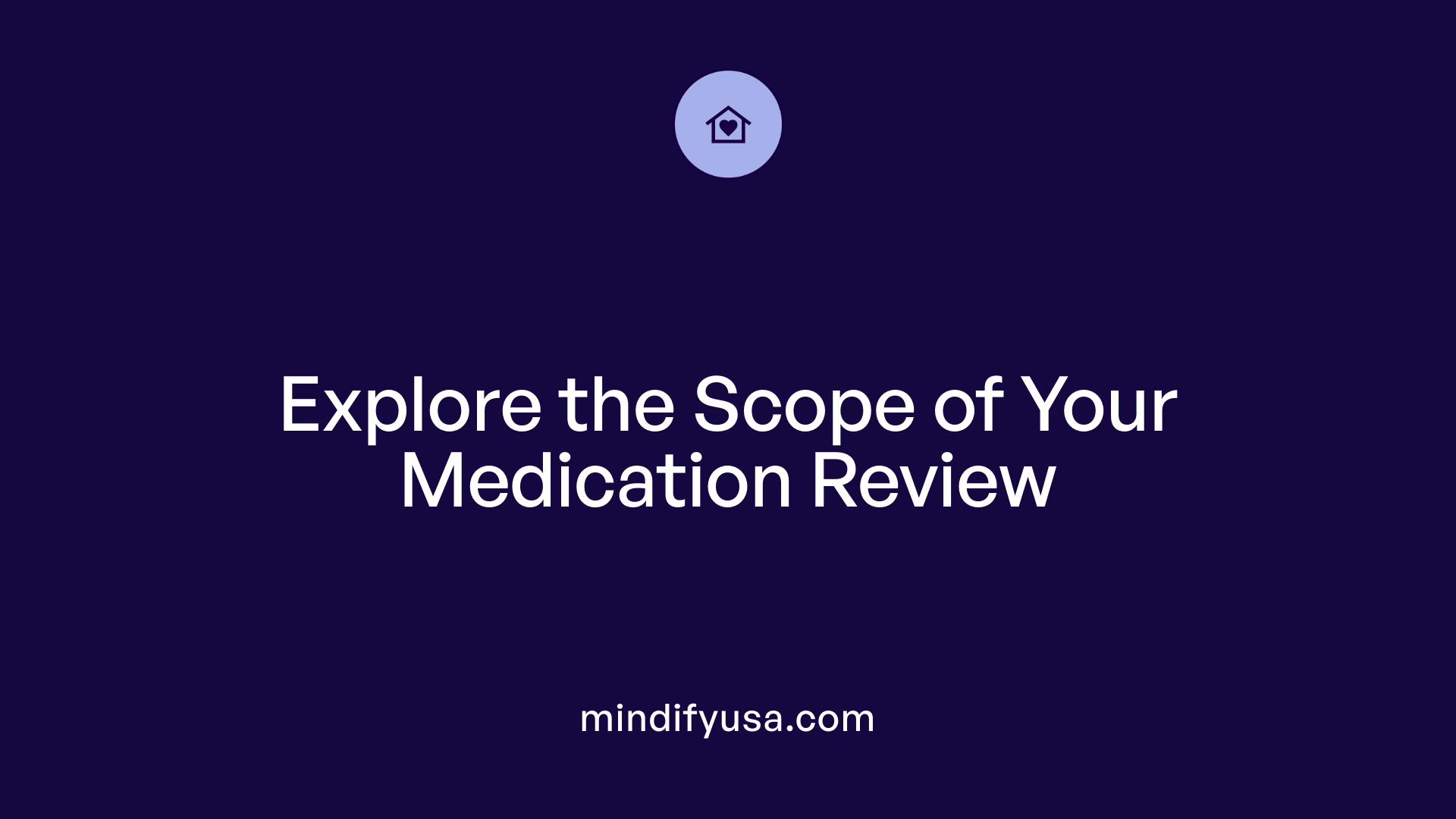Understanding the Scope of Medication Reviews
Medication reviews are comprehensive assessments conducted by healthcare professionals to optimize medication use and enhance patient safety. As part of routine healthcare, these reviews encompass not only prescription medications but also over-the-counter drugs, vitamins, and herbal supplements. With the increasing use of various health products, understanding whether and how supplements are included in medication reviews is crucial for ensuring safe medication practices.
What Are Medication Reviews and Their Included Components

What is a medication review?
A medication review, also called medication reconciliation, is a structured process that healthcare professionals use to evaluate all medications a patient is taking. This includes prescription drugs, over-the-counter (OTC) medications, vitamins, herbal remedies, and supplements. The primary goal is to optimize medication use, ensuring safety, effectiveness, and appropriateness for the patient’s health conditions.
Typically conducted during routine check-ups, hospital discharges, or medication changes, these reviews help prevent adverse effects, drug interactions, and unnecessary medication use. They serve as an important tool in comprehensive patient care to improve outcomes.
Components included in a medication review
A thorough review involves multiple steps, such as:
- Comparing the patient’s current medications with medical records
- Examining dosages and administration frequency
- Discussing the purpose of each medication
- Checking for duplications or unnecessary medications
- Assessing for potential interactions or side effects
- Providing education and counseling
- Making recommendations for adjustments or discontinuations
This process often involves collaboration between pharmacists, physicians, and nurses, aiming for a complete picture of the patient’s medication regimen.
Do medication reviews include supplements such as vitamins and herbal products?
Yes, medication reviews frequently encompass an evaluation of all substances the patient is taking, including supplements like vitamins D, B, E, herbal products such as Ginkgo, and other nutritional supplements. These reviews aim to identify potential interactions, overuse, or unnecessary continuation of supplements.
Vitamins and herbal products can overlap with prescription medications or extend beyond safe dosing, increasing risks such as bleeding with Vitamin E and Ginkgo, especially for patients on blood thinners. Addressing these during the review ensures that supplements support health without causing harm.
Including supplements in the review helps detect issues like excessive intake, duplicate products, or adverse effects, ensuring a safe and effective medication and supplement plan tailored to the individual.
Overall, incorporating supplements into medication reviews helps optimize treatment, avoid interactions, and promote patient safety.
Scope and Depth of a Typical Medication Review

What is the scope of a typical medication review?
A medication review involves carefully examining all the medications a patient is currently taking. This includes prescription medications, over-the-counter drugs, vitamins, and herbal supplements. The main aim is to spot any issues caused by medication use, such as unnecessary or duplicate therapies, potential drug interactions, or incorrect dosages.
Healthcare professionals like pharmacists or doctors conduct these reviews, often working closely with the patient to gather accurate information. They check for safety, effectiveness, and whether the medications are being taken properly. This process helps to minimize adverse effects, reduce medication burden, and ensure that each medication contributes positively to the patient's health.
The process of systematic evaluation
The review is a structured process that may range from a quick check-up to an in-depth clinical assessment. It typically starts with comparing the patient’s current medication list to their actual medication use, including herbal and nutritional supplements. The healthcare provider then assesses each medication for appropriateness, possible interactions—especially those that increase bleeding risk, such as with Vitamin E or Ginkgo—and adherence.
During the review, the provider discusses how medications work, addresses patient questions, and recommends any necessary changes. Especially during annual check-ups, after hospital stays, or when new medications are added, these reviews help keep medication regimens safe and effective.
Goals of medication review including safety, efficacy, and adherence
The primary goals are to ensure medications are safe, effective, and used as intended. This includes identifying and stopping unnecessary supplements, such as glucosamine when the underlying condition has resolved. It also involves checking for drug interactions—like the increased bleeding risk in those on blood thinners from herbal supplements—and correcting dosing errors.
Another important aim is to improve medication adherence by providing education and counseling, which in turn can enhance health outcomes. Additionally, medication reviews help in managing total medication burden, preventing medical errors, lowering healthcare costs, and supporting personalized patient care.
| Components of a Medication Review | Activities Involved | Focus Areas |
|---|---|---|
| Prescription drugs | Reconciliation with actual intake | Safety, interactions, efficacy |
| Over-the-counter meds | Evaluation of OTC use | Appropriate use, interactions |
| Vitamins and supplements | Assessment of supplement necessity | Excessive intake, interactions |
| Clinical assessment | Patient consultation and education | Adherence, side effects, lifestyle |
Overall, medication reviews serve as an essential part of healthcare, helping to optimize pharmacotherapy through a thorough, systematic process that addresses all elements of medication use—including supplements.
The Benefits of Including Supplements in Medication Reviews

What are the benefits of including supplements and herbal products in medication reviews?
Including supplements and herbal products in medication reviews provides a comprehensive picture of a patient's medication use. Many people take vitamins, herbal remedies like Ginkgo, or over-the-counter medications alongside prescribed drugs without regular checks. This integration helps identify potential interactions, such as supplements that may increase bleeding risk, especially for patients on blood thinners.
By reviewing these products, healthcare providers can assess whether they are still necessary and safe. For instance, patients often continue taking glucosamine even after their joint pain has resolved, which might be unnecessary. Eliminating such redundancies minimizes medication burden and reduces the risk of side effects.
Incorporating supplements into medication management also supports better adherence to actual prescribed medications. Patients gain clearer understanding of their treatments, and providers can give tailored advice on safe use.
Overall, including supplements in medication reviews enhances safety, prevents adverse interactions, and ensures therapies are appropriate. This approach helps optimize health outcomes, especially in older adults or those with multiple health conditions, by reducing unnecessary medication use and the potential for harmful interactions. Healthcare professionals, through structured reviews, can provide more personalized care, ultimately improving patients' safety and well-being.
Standards, Regulations, and Best Practices in Medication Review

What standards define a comprehensive medication review, especially regarding supplements?
A thorough medication review involves evaluating all substances a patient takes, including prescriptions, over-the-counter remedies, vitamins, and dietary supplements. Recognized standards highlight the importance of identifying potential interactions, safety issues, and efficacy concerns. This means assessing whether supplements like vitamin D, E, B, herbal products like Ginkgo, or glucosamine are necessary, safe, and properly dosed.
Healthcare professionals should counsel patients on supplement use, ensuring products are correctly labeled, free from contaminants, and suitable for their health conditions. Proper documentation of all supplements is vital, especially for vulnerable groups such as pregnant women or children.
Given that supplements are often less regulated than medications, their quality may vary. The regulatory environment typically involves industry standards and post-market oversight. The U.S. FDA, for example, does not review dietary supplements for efficacy before release but enforces labeling and safety standards after products reach the market.
The goal of these standards is reducing risks associated with supplement use, preventing adverse interactions, such as increased bleeding risk with Ginkgo or Vitamin E, and ensuring safe, effective therapy tailored to the patient. Including supplements in medication reviews helps clinicians make informed decisions, ultimately improving health outcomes.
Are there regulations or best practices that specify whether supplements should be included in medication reviews?
Regulations concerning supplements in medication reviews depend on the jurisdiction. In the United States, the Dietary Supplement Health and Education Act (DSHEA) of 1994 primarily governs supplements by setting labeling and safety rules, but it does not require pre-market approval for effectiveness or safety.
Despite limited regulatory oversight, best practices from healthcare organizations and professional bodies emphasize reviewing all substances a patient uses. Pharmacists, physicians, and nurses are encouraged to include herbal products, vitamins, and other supplements during medication reconciliation.
This comprehensive approach ensures that potential interactions — like herbal supplements affecting blood clotting or metabolic pathways — are identified and managed appropriately.
Including supplements in medication reviews is a proactive step to enhance safety, optimize therapeutic effectiveness, and prevent adverse effects. Although regulations may not mandate their review, the consensus among healthcare providers is that considering all ingested substances supports better patient care.
A Holistic Approach to Patient Safety
The integration of supplements into medication reviews is a vital aspect of comprehensive patient care. As awareness about supplement use grows, healthcare providers recognize that a complete review of all medications, including herbal and dietary supplements, significantly enhances safety and therapeutic outcomes. By adhering to clinical standards and best practices, clinicians can identify potential interactions, prevent adverse events, and tailor treatments to individual needs. Ultimately, proactive and inclusive medication reviews embody a holistic approach to health, ensuring that all aspects of medication use support the best possible outcomes for patients across diverse healthcare settings.
References
- Why medication reviews are so important - UCHealth Today
- What is a Medication Review?
- Medication Review: What's in a Name and What Is It about?
- Have You Had a Comprehensive Medication Review?
- Care of Older Adults (COA): Medication Review
- What is a Comprehensive Medication Review?
- Medication Review: What's in a Name and What Is It about?
- Medication reviews - PMC





































































































